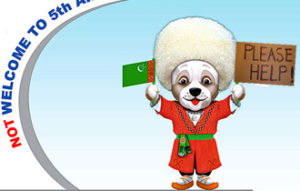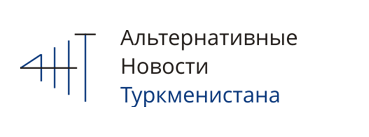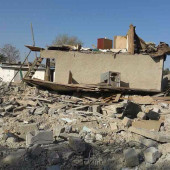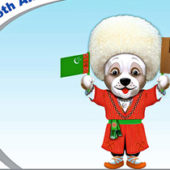 Amsterdam, June 20, 2017 – Ever since Ashgabat was selected to hold the 2017 Asian Indoor and Martial Arts Games, the people of Turkmenistan have suffered the consequences of the preparations for this sporting event. The totalitarian regime of President Gurbanguly Berdymuhamedov, criticized by the international community for systematic violations of basic civil rights and freedoms, as well as for suppressing even the slightest dissent, has used any excuse to demonstrate to its population how the image of Turkmenistan and its leader are internationally recognized. The participation of democratic countries of Asia and Oceania in these Games is only the latest excuse. Here are five reasons why these countries should boycott the Games and the refrain from sending their athletes to Ashgabat.
Amsterdam, June 20, 2017 – Ever since Ashgabat was selected to hold the 2017 Asian Indoor and Martial Arts Games, the people of Turkmenistan have suffered the consequences of the preparations for this sporting event. The totalitarian regime of President Gurbanguly Berdymuhamedov, criticized by the international community for systematic violations of basic civil rights and freedoms, as well as for suppressing even the slightest dissent, has used any excuse to demonstrate to its population how the image of Turkmenistan and its leader are internationally recognized. The participation of democratic countries of Asia and Oceania in these Games is only the latest excuse. Here are five reasons why these countries should boycott the Games and the refrain from sending their athletes to Ashgabat.
- The Asian Games deprived tens of thousands of people of their homes
Between March 2014 and April 2015, as part of a campaign to improve the capital city for the upcoming Games, the authorities knocked down more than 10,000 houses in the village of Choganly near Ashgabat, leaving at least 50,000 people homeless. Human rights watchdog Amnesty International examined satellite imagery before and after the demolition campaign. Local eyewitnesses and victims told Amnesty International that citizens tried to protect their property, standing with their children in front of the advancing excavators. However, nobody has a chance to stand against the Turkmen state machine. RFE/RL reported in March 2015 that the police dispersed several women who had protested against the arbitrary actions of local authorities; one of the protesters lost consciousness and later died. The government did not provide either alternative housing or land rights to the people it evicted.
- Lack of financial transparency and accountability
The government’s plan behind the demolition of the village of Choganly was the construction of a new international airport, famous as the largest in Central Asia and featured in the Guinness Book of Records. The “old” airport only operated for 22 years and was comparatively underused because of the minimal flow of passengers, but the new airport made it redundant and it was swiftly demolished. President Gurbanguly Berdymuhamedov personally commissioned the construction of the airport by the Turkish company Polimeks, without a public tender. The total cost of the project was more than $2.2 billion. A few months after Polimeks was officially appointed as the contractor, a Turkmen airplane with 1.3 tons of gold was detained in Istanbul. The non-declared cargo belonged to Polimeks. According to the cargo documents, the plane was allegedly transporting toilets and washbasins.
In countries where a civil society and an independent press exist, this news would have immediately triggered a big scandal and, possibly, criminal investigations and loud resignations of high-ranking officials. This happened recently in South Korea, but unfortunately in Turkmenistan there is neither a civil society nor an independent press.
Instead, the incident had no negative consequences for Polimeks, which was even invited to build an “Olympic” Village for the 2017 Asian Games. The total budget for the project amounted to more than $5 billion. Similarly to the case of the airport, the people of Turkmenistan were kept in the dark regarding the choice of the contractor and the detailed costs for the construction. And they have the right to know about this project, if only because the allocated budget ran out one year before the beginning of the Games, forcing the authorities to extract “donations” from employees of state enterprises and institutions, as well as entrepreneurs, to complete the preparations for the Asian Games.
- Do you want to criticize the government? You’ll go to prison!
President Berdymuhamedov, like his predecessor Saparmurat Niyazov, does not tolerate criticism towards his policies and responds mercilessly to those who dare to object. Some of the consequences for criticizing the elite are threats of termination of work or study, physical violence, imprisonment – which, in conditions of total corruption, lack of transparency and fair justice, could easily result in death or disappearance.
Since the end of 2003 – still under Niyazov – dozens of people, accused of attempting a coup and assassination of the president, went missing. Two of them had served as foreign ministers: Boris Shikhmuradov (1995-2000) and Batyr Berdyev (2001-2002). Nobody knows about Shikhmuradov or Berdyev’s fate, as well as hundreds of other people who disappeared in Turkmen prisons due to the mass repressions of the early 2000s.
About six dozen residents of the city of Turkmenabat are incommunicado in state prisons, after being convicted for their “incorrect religious beliefs.” Their leader, 34-year-old Bahram Saparov, was last seen in 2014 in Ovadan-Depe, the most brutal Turkmen prison. According to eyewitness, his face was so beaten up that he was barely recognizable.
Several people who dared to go against the system and communicated with foreign diplomats or journalists are also now in prison. All of them were charged with use or distribution of illegal drugs. Mansur Mingelov, a Baloch rights activist, recorded 11 cases of torture by anti-narcotics police against Baloch suspects and sent his reports to the U.S. Embassy in Turkmenistan, the OSCE and the Prosecutor General’s Office of Turkmenistan. As a consequence, he was arrested on several criminal charges, including drug-related crimes, and sentenced to 22 years in prison.
In the summer of 2015, another local civil activist, journalist Saparmamed Nepeskuliev, was also reportedly sentenced for drug-related crimes while reporting for Radio Liberty and Alternative Turkmenistan News. His reports covered the critical state of several cities, as residents could not have access to drinking water for days, roads were damaged, and health services were improperly managed. All this came against the backdrop of large-scale construction projects ahead of the 2017 Asian Games. Nepeskuliev’s activity resulted in a closed trial and three years in prison. The UN Working Group on Arbitrary Detention said his arrest was arbitrary and demanded that the Turkmen authorities immediately release him.
- Slavery still exists in Turkmenistan
Every autumn, tens of thousands of citizens, mostly civil servants, including teachers and doctors, are forcibly sent to the cotton fields for the harvest. The authorities have established a system of punishments for refusing to pick cotton or for failure to meet the official quota: reprimands, pay cuts, layoffs. Because of the high level of unemployment, people have no choice but to obey. Several global retail brands have already refused to buy Turkmen cotton or textiles, due to the use of forced labor, and the U.S. government has cut Turkmenistan’s rating to the lowest level in its annual Trafficking in Persons report.
Gaspar Matalaev from Turkmenabat was arrested in the fall of 2016 and sentenced to three years in prison solely for exercising his right as a citizen to publicly report the numerous cases of forced labor in the cotton fields. Matalaev, like Mingelov and Nepeskuliev, was imprisoned not for the ostensible crime but for political reasons. This makes them ineligible for the amnesty that the government regularly grants to some prisoners.
The sports apparel for the participants of the Asian Games, as well as the towels and linen in their hotel rooms, will be manufactured from cotton collected by forced labor.
- Mass killings of domestic animals
As part of the country’s preparations for the Asian Games, the capital’s municipal services were instructed to kill stray cats and dogs around the city. Officially, the animals were slaughtered “for sanitary purposes,” but in reality the measure was taken so that they do not catch the eye of the organizer and inspirer of the Asian Games – Gurbanguly Berdymuhamedov. The cruelty of these killings was unprecedented: they were slaughtered using metal pipes, shovels and ropes. Utility service workers continue to kill animals indiscriminately, including domestic ones they see on the streets. Often these barbaric killings take place in front of children in communal yards or before the eyes of the animals’ defenseless owners. The animal corpses are then taken out of town and dumped in designated pits.
Stray and domestic cats and dogs, including their offspring, are also killed by poisoning their food. The unfortunate animals experience terrible torment and convulsions before dying.
Animal welfare activists in the country recorded hundreds of these cases, some even captured in photo and video. Animal advocates are also persecuted and harassed for trying to defend the animals. They also risk being arrested and convicted on fabricated criminal charges.
***
There is much more to say and show on why the civilized, democratic countries of Asia and Oceania should refrain from participating in the Asian Games in Ashgabat. The oppression of LGBT people in Turkmenistan, for example, is tangible: from the criminalization of same-sex relations to policemen threatening, insulting, and torturing gay and transgender people, to forensic doctors conduct humiliating rectal “inspections.” And this resulted in hundreds of men accused of homosexual relationships, being imprisoned and severely bullied by guards and cellmates.
Countries that received an invitation to the 2017 Asian Games, especially those, which protect human dignity, human rights, civil liberties and the rule of law, should withdraw their participation, because these Games are primarily aimed not at promoting sports, but at strengthening the personality cult and personal enrichment of the dictator Gurbanguly Berdymuhamedov. He even boasts that holding international competitions in the country improves the global image of Turkmenistan as a strong, economically stable, hospitable country, with its capital, Ashgabat, covered in white marble. The world should know that this façade is far from reality.
Read this statement in Russian.
Contact: Ruslan Myatiev
E-mail: [email protected]
Tel: +31684654547
#AIMAG2017 #Ashgabat2017





